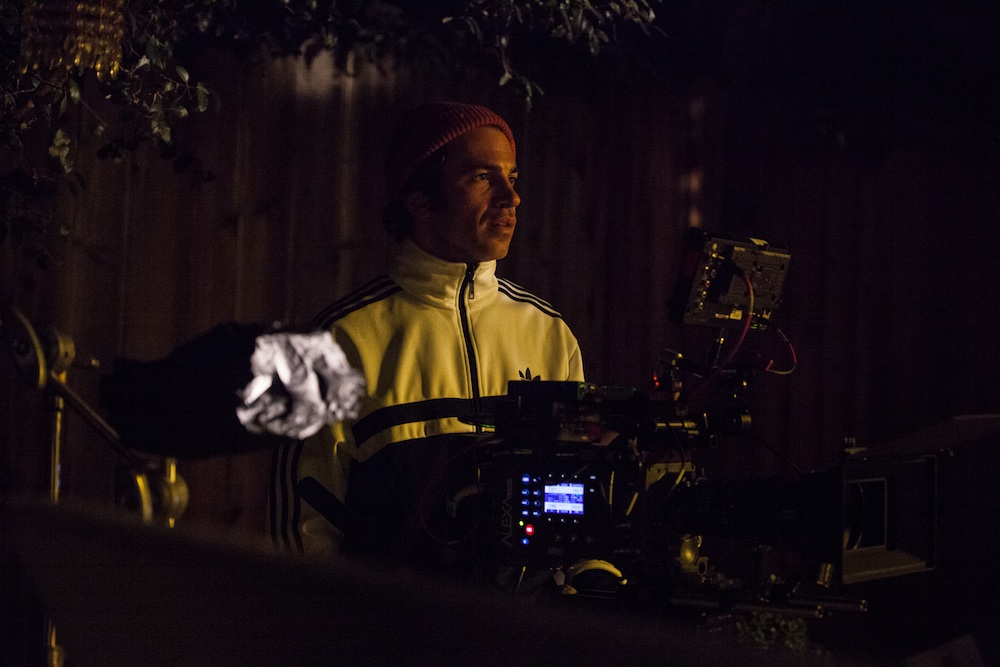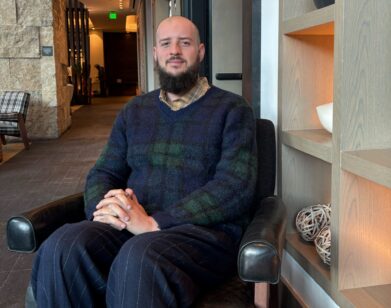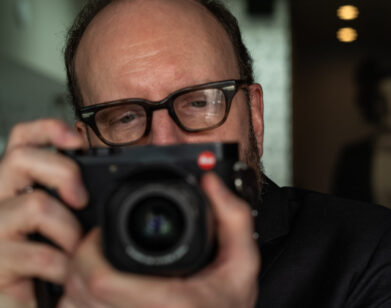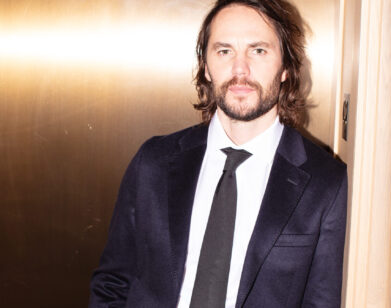Through the Lens of Chris Messina

ABOVE: CHRIS MESSINA ON THE SET OF ALEX OF VENICE.
2013 was to Chris Messina what 2012 was to Jessica Chastain, and what 2014 is panning out to be for Chiwetel Ejiofor. His face, as an actor, seemed to be just about everywhere: on The Mindy Project, and The Newsroom, in Argo. Messina’s directorial debut—Alex of Venice—premiered at the TriBeCa Film Festival last Friday, and with it, the notion that he may soon become equally ubiquitous off screen.
Set in Venice, California, the film follows Alex (Mary Elizabeth Winstead), an overworked environmental lawyer who is suddenly left by her stay-at-home, surfer-cum-painter husband. Messina elicits particularly impressive performances from Winstead and Don Johnson, who plays her aging actor father. Messina co-stars in the film as Alex’s husband George, though he’s absent for most of it, with Skylar Gaertner playing Alex and George’s son and Katie Nehra as Alex’s sister. The score and light-drenched cinematography contribute to the story as much as the acting does, creating the feeling that you’re not watching a story so much as witnessing an immersive experience.
Johnson’s character gets a part in a local adaptation of the Chekhov play The Cherry Orchard, paralleling Winstead’s struggle against a real estate developer (played by Derek Luke) who is building a spa on a marsh inhabited by endangered tadpoles. Realizing that’s she’s fighting harder for the tadpoles than for her marriage—and failing at both—Alex is forced to accept the ways in which her life is in shambles, as well as the ways in which it’s actually quite stable.
In a lot of ways, Alex of Venice is Messina and co-writer Justin Shilton’s sun-specked love letter to Venice. In others, it’s a subtle nod to ’70s films like Kramer vs. Kramer, grappling with the idea of what it is to function as a family. Ultimately, it’s an irrefutably impressive first shot at directing that’s real and unassuming, in the tradition of Blue Valentine and co-writer Jessica Goldberg’s Parenthood.
When we sat down with him, Messina seemed as fascinated by the filmmaking process as a student, although he’d created a film with the quiet maturity of a director many years in.
KENZI ABOU-SABE: I think the last time we interviewed you, you were doing press for 28 Hotel Rooms, and you told us that you were early in development on two scripts that you were thinking of directing.
CHRIS MESSINA: Oh wow.
ABOU-SABE: So I assume one of them turned into Alex of Venice—
MESSINA: Yeah.
ABOU-SABE:—Which is kind of cool. Can you tell me a little about how and why you got involved in the project?
MESSINA: Yeah, 28 Hotel Rooms, the producers of that—Jamie Patricof and Lynette Howell—they knew I wanted to direct, and so they gave me this script. It wasn’t called Alex of Venice, and they said, “Would you be interested in this?” It was this collage of all these characters in Venice, but at the core of it was this family that was really interesting to me. So we kind of cut back on the collage, and we focused on the family. And the writing was just great. It reminded me of my family, and me, and my friends.
ABOU-SABE: Did you know the writers?
MESSINA: I knew Katie [Nehra] a little bit from New York. I met her at the Labyrinth Theater Company—Phil Hoffman’s theater company—but I didn’t know her well. And we worked on it for a while, and they wrote a new outline and a new script, and it was much closer to what I was thinking. Then Jess Goldberg, who’s an amazing writer, really cracked open the story for us in this fresh way. She created that Don Johnson character—
ABOU-SABE: He didn’t exist before?
MESSINA: He didn’t exist before. And she brought in The Cherry Orchard and the whole element of that play being a mirror of what’s going on the film.
ABOU-SABE: Yeah.
MESSINA: So it was then that I realized, you know, I like this, I think I know what to do with it. I’d like to try to direct.
ABOU-SABE: After those initial changes, how much did the film change? Did you stick to the script once you had it?
MESSINA: It constantly changed. It changed when we were filming—it was a lot of improvisation—and then it changed in the editing room. I’m sure you’ve heard this a million times, but editing is just so fantastic.
ABOU-SABE: Yeah. And stressful.
MESSINA: Very stressful. Also because I was shooting on The Mindy Project while I was editing, which was the stupidest thing I could’ve done. It was like having two full-time jobs. But in editing some characters were dropped, some storylines were dropped. It just starts dictating what it’s supposed to be.
It’s scary, but fun to try to be brave and to “kill your darlings.” To get rid of the stuff that you were like, “Oh, I’ll never get rid of that. I love that. As long of a take as it is, I’m gonna keep that in.” Then you start watching the movie and seeing the rhythms and storylines that are really resonating with people, and you just start cutting.
ABOU-SABE: During post-production, was there anyone that you trusted to show the film to—someone that you really wanted an opinion from?
MESSINA: Certainly the producers, who’re super smart. They did Half Nelson and Blue Valentine and [The Place] Beyond the Pines.
ABOU-SABE: I didn’t realize that. Wow.
MESSINA: Yeah. And my wife Jennifer Todd, who’s a producer. She runs Matt Damon and Ben Affleck’s company, and she produced Memento, and Boiler Room, and Prime, and Across the Universe… and Alice in Wonderland…
ABOU-SABE: So constant opinions from her as well?
MESSINA: [laughs] Yeah. She’s really smart, and very helpful. That was nice, because I was super neurotic and worried.
ABOU-SABE: I’m sure.
MESSINA: You’re constantly testing things out. Like, how does this play versus this? Maybe even the same scene.
ABOU-SABE: Did you have disaster scenarios in your head, since this was your first time directing?
MESSINA: Yeah. I mean, in the editing room, you sit there, and you’re so happy about a lot of it. You’ve got these great actors, and the DP’s great, and you love it… And then there’s so much you’re mad about. Cause you’ve made so many mistakes. So yeah, there’re scenarios where you’re like, “Ah, I wish I could change this. How do I make this better?” “No matter what I do, the scene’s not working, what do I do?”…
ABOU-SABE: Was there any scene in particular that was really problematic?
MESSINA: Yeah, the scene with me and Don Johnson, where I’m mad at him—right before we break up. That was my first scene with Don Johnson, and I didn’t love my performance in that.
ABOU-SABE: Really? From my perspective, that was really emotional and dramatic. I was like, “Wow, okay this movie’s getting right to it.”
MESSINA: Well thank you. You know, it’s a hard movie to start.
ABOU-SABE: I’m always impressed when a movie’s hardly begun and it’s already eliciting emotions from the crowd.
MESSINA: Yeah, in the first 10 minutes you have a breakup. It’s difficult. I struggled with the first 10 minutes, or even the first act in general. I copied a lot of movies, but I watched Kramer vs. Kramer a lot, and that movie starts right on the breakup. So there was a version of the movie where I started outside, on the porch [during the breakup].
ABOU-SABE: Oh really?
MESSINA: But that seemed too jarring. We didn’t know anybody yet. But I’m glad you liked that scene. In the script it said that my character was crying, in the stage direction. And the minute that an actor reads that they’re supposed to cry, it puts a giant weight on their shoulders. So I got emotional a couple times, and it was okay, and then I started to dry up, and it started to become like I was pushing and forcing tears, it was no good. My friend Matt Del Negro directed me while I was on camera, and he said, “We got the crying. I think you should get mad at him.” And it didn’t seem right. He says, “You’re frustrated, you don’t want to be in this house, you don’t want to do this.” I said, “Okay,” I just trusted him. And in the editing room, I was like well, we won’t go with the yelling, the crying is what’s written. But it never worked, so we said, “You know, Matt made me get angry at him, let’s look at those takes.” And that’s what we went with. It’s a great example of when you think it’s one way, “No, no, no, it’s gotta be like this,” and then it turns out you just need options. In the editing room, that’s when you’re thrilled. “Did we get any take where she’s happy?” “Yes there’s that one take.” “Good, cause that’s what it needs to be.” Woody Allen, when we did Vicky Cristina Barcelona, said to Rebecca Hall, “Do it one time happy, one time sad, and one time indifferent, as I won’t know where you should be until I’m editing this, in terms of your emotions.”
ABOU-SABE: I cried during the movie, the girl next to me was crying… [laughs]
MESSINA: When she was crying in the car?
ABOU-SABE: I think it was when you and Mary Winstead’s character are in the bed, and she tells you that she thinks her dad has Alzheimer’s.
MESSINA: Oh, that’s so sad.
ABOU-SABE: I thought maybe it was just me, but I looked around and both people sitting next to me were crying too. If you’ve got the audience crying, who needs tears in the film?
MESSINA: Well they say, if you cry too much on screen, you’re crying for the audience.
ABOU-SABE: Are you a fan of trying to film chronologically, or is it just too difficult logistically?
MESSINA: Well, I’ve never done that as an actor, but I would love to do that. It’s always time and money. It was one big jigsaw puzzle being pieced together.
ABOU-SABE: Is that one of the major differences between stage and screen? I know you’ve spent a lot of time in theater.
MESSINA: Yeah, definitely. You live through the play at 8 o’clock, straight through, and nobody can call “Cut!” But also with the stage you’re getting instant reactions. You hear people snoring in the audience, and bored to tears, or sometimes you hear the laughter, and you can hear them listening.
ABOU-SABE: Yeah. I want to talk a little bit about the visuals and the sound. Those are both huge parts of the film. It almost looks, and watches, like an ode to Venice—do you have any personal attachment to Venice at all?
MESSINA: I live close by, and I love it. It feels a little bit like Brooklyn-by-the-sea to me. I love the people there. They’re an eclectic bunch. I love the light there, and the architecture there. So I was definitely excited about keeping the movie there. It also feels a little bit like a small town. In terms of the visual, the director of photography Doug Emmett is phenomenal. The way he shot, and the things we talked about, like capturing the sun flares, was really important to us. We’re both big fans of ’70s films, and we were looking at directors like Robert Altman or Hal Ashby, and we wanted to kind of give it that ’70s look. But I like that you said that, because I think that might have been the most surprising thing about making the movie, what a difference sound design makes. So if you and I were talking in this room right here, in the scene, if you can hear that chatter back there, and a maybe phone ring, and a printer or something, it just fills [the scene] out.
When we shoot the scene, they want total quiet, for our dialogue and everything. [But] if we just put that scene up it might feel flat. The sound design was shocking to me—how much it fills the movie out and makes it a lot more real.
ABOU-SABE: You said at the Q&A that as an actor you thought you understood what all the different departments and the different jobs on set did, and then as a director you realized you really just didn’t at all. What did you mean by that?
MESSINA: [laughs] Kind of that it takes a village to make a movie—the set decorator, the set design and all those elements… You could be great in a film, and people might like your performance, but if they don’t believe the set design, if they don’t believe the sound—all that stuff that enhances a performance, or enhances a film. So I have such great admiration for all those departments now. And again, I might be repeating myself, but I thought I understood it, and I really didn’t. Nobody talks about the sound design. I mean, they do, but they start by talking about the actors and the director. And that’s cool, ’cause we couldn’t do it without the actors and the director, but all those elements are huge. For my movie, it just got better and better and better when those elements came in.
ALEX OF VENICE IS CURRENTLY SCREENING AT THE TRIBECA FILM FESTIVAL.






